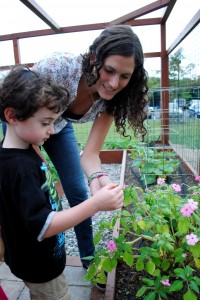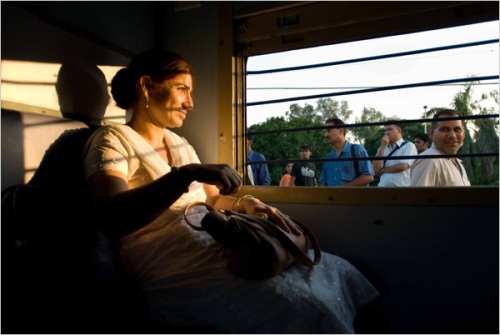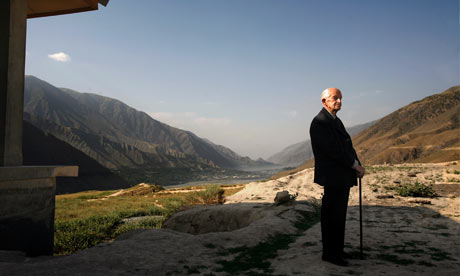Another article I wrote that came out last Friday in my school newspaper, Inklings. (Again, you can check out the entire paper online here.) This article is a news story — not an opinion — about a nice edition to the school grounds and curriculum.
“Community Garden Aims to Make School a Greener Place to Live”
Haris Durrani
October 2, 2009 — Inklings

HELPING HAND: A student shows a child around the school edible garden, paid for by Green Village Initiative (GVI). | Photo by Madeline Hardy, Inklings
In mid-spring of 2009, Westport Green Village Initiative (GVI), the grass roots organization that hopes to turn Westport into a model green town, proposed the idea of an edible, organic garden for the Staples community.
That garden stands behind the school building today.
“We feel that the most important thing for the future is to be able to have control of our own food,” said Monique Bosch, a Staples parent and GVI founder. “Moving away from what we might call industrial food and going back to real food. The best way to do that is to grow our own. And what better way to learn than to teach the next generation?”
Bosch, Dan Levinson, another Staples parent and GVI founder, Michael Aitkenhead, A.P. environmental teacher, and A.J. Kieffer ’10, Club Green President, were all grateful for the strong support from the Board of Education (BOE), Superintendent Elliot Landon, and Principal John Dodig.
“The school couldn’t afford anything like that [the garden],” said Cecilia Duffy, horticulture teacher. “So it was nice that they [GVI] stepped in.”
Starting early July, workers from Teich Garden Systems, a company that builds school gardens, and local volunteers – 20 men and women in total – dodged rainy weather on a trek set up the garden.
As the summer continued, Club Green members and other volunteers helped stain the garden’s wood framework.
A farm in Shelton which gives food to Westport for community-supported agriculture, in addition the horticulture department, provided seedlings for the workers and volunteers to plant.
A.P. environmental, horticulture, and culinary classes, along with the children from child development, have begun to harvest the results.
“There are some kids that have never seen a garden before, and that’s opening their eyes,” said Alison Grace, culinary teacher.
In fact, this garden represents more to the students, teachers, and community members involved than a simple plot of cultivated land.
“The garden serves two purposes,” said Michael Aitkenhead. “It’s to spread awareness of growing food organically. At the same time, it’s also being used as a tool to understand basic lessons about the science behind growing food.”
Levinson, Bosch, and Heather Morley, biology and A.P. environmental teacher, each mentioned that food travels an average distance of 1,500 miles to reach people’s mouths.
Community gardens, they said, will save time and energy.
“It’s so easy to grow food, and we’ve forgotten that,” said Levinson. “All the food is grown everywhere but where you eat it.”
According to Grace, there is a strong desire today for locally-grown foods, and hopes her students will learn more about it.
“It’s a trend that’s not going away,” Grace said. “This is the new thing.”
Kieffer emphasized the “pressing issue” of living green.
“The goal is to be self-sufficient,” Kieffer said. “Buying local produce is the best green thing to do. Having your own garden is the best way to be environmentally conscious.”
Now that GVI has established the garden, the organization will leave the rest in the hands of the school community.
“The idea is that at this point, Staples teachers and students will come up with a plan on what to do with it,” Bosch said. “Come spring, they will have their own garden beds to work with. We definitely want to see that it’s totally run and utilized by the teachers and students.”
Already, classes have begun plans to integrate the garden into their curriculums.
Morley said the garden will provide her biology students with a wider view of the subject – reminding them that the class is not only about mitosis, chromosomes, and cell structure, but about the multi-cellular organisms they are a part of.
Morley also said A.P. environmental classes will focus on growing the plants in an environmentally friendly manner by experimenting with different types of fertilizer, figuring out how fertilizer run-off and other harmful or beneficial garden outputs impact the surrounding ecosystem, and so on.
Linda McClary, who teaches child development, has incorporated the garden into the children’s “growing things” unit. Despite planting in the daycare courtyard during previous years, she said the garden will be a good improvement.
“It’s a community garden, which makes the kids more involved in the school,” McClary said.
In addition to the expected classes, Levinson, Bosch, and many teachers hope that other courses will integrate the garden into their curriculums. Chinese teacher Chris Fray has already planted a Chinese vegetable, Bok Choy.
This spring classes will be able to experiment with which plants they want for the garden.
“We’re going to have many failures,” Aitkenhead said, “but in the end that’s a good thing because we’ll be learning from our failures. And that’s what education is all about.”
For the future, some expressed ideas about school-wide composting. Aitkenhead hopes students will start a “Garden Club” devoted solely to running and promoting the garden. Many believe that nearby schools will be inspired to start their own community gardens.
“We are expecting to see gardens sprouting up all over the place,” Bosch said.
Teachers and the GVI Founders noted how easily gardening can solve many of our environmental and economic problems. Morley mentioned that it is often less expensive to buy a seed and plant it than to buy the plant itself.
“In a time when people are challenged about economics, this can save money,” Morley said.
Levinson emphasized the benefits community gardens can deliver in a simple fashion.
“Our food production and distribution system is the single biggest contributor to global warming,” Levinson said. “It’s not the planes or cars. It’s the food. Farming is the solution. It’s kind of simple if you think about it. It’s just gardening.”
… or read a shortened version of the article here.


